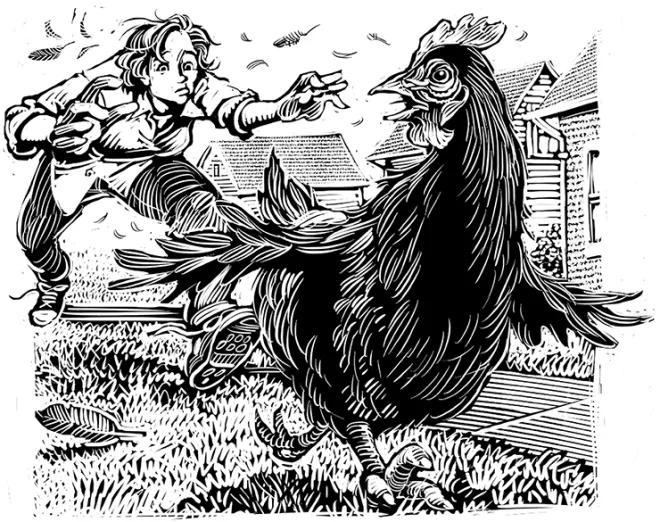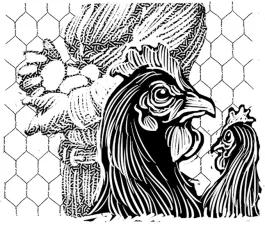
As a child in suburban Michigan, I rarely interacted with animals. My mother, though, was raised on a farm and tells stories of riding horses, milking cows, and gathering dozens of eggs from the family’s barn each day. She could balance five eggs in her hand at once. My recent foray into backyard chickens was, perhaps, some sort of attempt to connect with those roots. Since I live in the city, my aims were modest: fresh eggs, fewer kitchen scraps in the garbage, happy chicken sounds. And, so far, my small flock of poultry had been about as easy to manage as a tankful of fish.
That was before the June day of The Great Escape.
My youngest child and I were playing in the front yard when we noticed a golden ball bobbing under the hydrangea bushes. The golden ball was followed by two brown shadows. Uh, oh—three of my seven hens had broken out of their quarters.
A quick dash to the side gate revealed the chickens’ point of exit: My husband had left the gate open that morning. Fortunately, four of the chickens had not gotten much beyond the first yard weeds and were glad to scuttle back inside their coop when I ran at them. With the gate now latched, those four couldn’t escape, but the other three weren’t being so cooperative. I would have to catch them and carry them back in.
Anyone who has tried to catch a chicken in an open space understands what a merry chase they can lead. With eyes on the sides of their heads, they can see nearly 360 degrees. Since they are prey for almost anything, chickens have a swift, rolling gait and an entire playbook of duck-and-weave maneuvers. Catching three chickens who had the run of the neighborhood was going to take some cunning.
While assessing my options, I kept my two-year-old son, Edward, safely within arm’s length—no additional escapes today! Just then, a grey sky that had been threatening rain all morning started a fine drizzle. Edward thought this was great fun. Myself, I was feeling a bit ruffled.
Taking deep breaths and shaking my arms like a boxer preparing for a match, I commenced to corral the three hens. Chicken-herding means walking five to six feet behind them, bent at the waist with arms outstretched. I clucked firmly but nonthreateningly, hoping they wouldn’t bolt. Edward helpfully instructed the hens to “Shoo!” in his squeaky toddler voice. Incredibly, they headed toward the coop, at their own particular dash-munch-dash pace.
Since the chickens were about two-thirds of the way around the house, I gently steered them the rest of the way around, rather than backtrack to the gate by the driveway. I figured I could hoist caught birds over their coop fence. (Their wings have been clipped, so they can’t fly out.)
Luckily for me, the area we were headed towards was bordered on two more sides by quirky house corners, making a three-sided box. This 12’ x 8’ space is empty except for two air conditioning units. Easy peasy, I thought. Who can’t catch a chicken that’s cornered behind an air conditioner?
While the birds placidly pecked grass in their makeshift hold-ing area, I crouch-walked slowly toward the golden hen, moving steadily so as to not startle her. When she was within arm’s length, I grabbed for her. She ran right between my legs—and I did a summersault! The other two fled, as well. Edward laughed.
Back in the yard, the three chickens kept a wary eye on me. When they saw me crouch-walking again, they ran into my neighbor’s backyard. Fortunately for them, the yard was empty of the two large dogs who live there. I grabbed Edward’s hand and together we gently shooed the hens back to the corner by the air conditioners.
Thanks to the mellowing of memories over time, my mother’s stories about her childhood always sound calm and dignified. Matter-of-fact. They shoveled manure. They bedded animals. That’s what farmers did. Their black-and-white photos never looked as ridiculous as I felt, chasing chickens around my house in the rain. But perseverance runs in my blood. If they could manage a farm during a drought, I could handle a miniflock of wayward fowl.
Edward and I ran inside for our secret weapon: dry, uncooked oatmeal. We filled a pink plastic cup with oats. If sprinkled widely, they might distract a chicken long enough for me to grab her. When we got outside, I handed the cup to Edward. He dumped the contents onto the ground. The hens began to devour the pile.
Amazingly, I was able to grab the golden girl—named Ariel by my daughter—and tuck her under my arm with her wings folded in. This chicken football hold calmed Ariel and gave me a chance to carry her back to her pen. I tossed the “football” over the coop fence, directly into her home. Ariel squawked and flapped at the indignity of being thrown, then landed with a soft thump. She then clucked quietly and resumed searching for tasty morsels. The morning drizzle increased to a steady drip.
Leia and Dashi (also named by my daughter) now watched me with undisguised suspicion. Their weight shifted between their chicken legs. I stationed Edward at one opening next to the air conditioner, and I crouch-walked slowly toward the hens. They dashed out, slightly to the left of Edward. Instead of trying to halt their flight, he turned around and galloped off with them! I calmed him down, and we gently shooed them back to the corner with the oatmeal and tried again. Another escape. We shepherded them back to the oatmeal again. And again. And again. And again—four more times. My hair stuck to my forehead in a soggy clump.
Drawing deep from reserves of patience and stubbornness, with visions of my stalwart forebears cheering me on, I rallied for yet another attempt. Success! Leia, snagged, sailed through the air to rejoin her coop-mates. Dashi now paced next to the fence, anxious to find her missing compatriots.
At that point, she may have recognized me as her rescuer rather than her predator, because we caught her with only a few extra scrambles and empty grabs. Over the fence she went. I wiped my hands on each other. Job done.
Once inside and in dry clothes, I sat by a window and looked into the backyard. Huddled out of the rain under their elevated henhouse, the chickens clucked the social, contented noises of birds exchanging the day’s news, safe from the perils of suburbia.

Later, I donned my gardening boots and entered the coop to bring out the day’s kitchen scraps. The chickens gave no sign of their earlier shenanigans. While in the pen, I gathered three or four brown and blue eggs, balanced them carefully in (both) hands, and tucked them into a carton for the next day’s breakfast. The spirits of my grandparents and my mother hovered near.
Laughing. ❖



